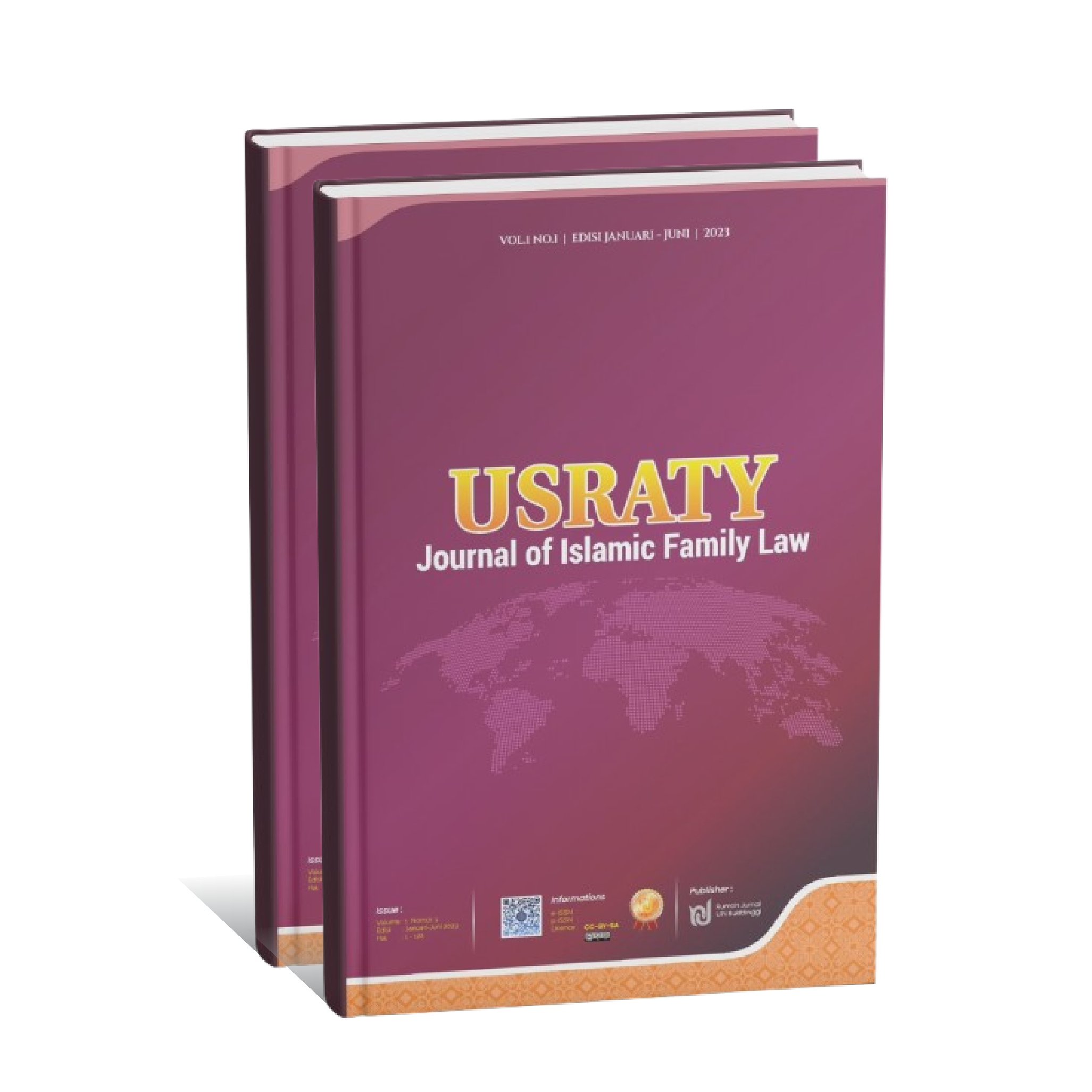Post-Divorce Mut’ah: The Reinforcement of Gender Hierarchies in the Practice of Religious Courts
DOI:
https://doi.org/10.30983/usraty.v3i1.8844Keywords:
Gender Hierarchies, Islamic Law, Post-Divorce Justice, Religious Courts, Women’s RightsAbstract
This study investigates the role of post-divorce mut’ah (a form of consolatory gift from husband to wife) in reinforcing gender hierarchies within the religious court system in Indonesia. The primary aim is to explore how mut’ah is conceptualized, negotiated, and decided upon in courtrooms, and how this process reflects broader socio-religious power relations between men and women in post-divorce contexts. Employing a qualitative research method, this study is based on in-depth interviews with judges, divorced women, and legal advocates in three religious courts across Java and Sumatra. In addition, courtroom observations and analysis of case documents were conducted to understand how mut’ah claims are framed and adjudicated. The findings indicate that although mut’ah is formally recognized under Islamic legal doctrine and Indonesian religious court jurisprudence, its implementation remains inconsistent and highly gendered. Judges often interpret mut’ah as non-obligatory and discretionary, resulting in many divorced women being denied this right, especially in cases where the woman is perceived as “at fault.” The courtroom discourse often reaffirms patriarchal norms, positioning women as dependent and less entitled to post-divorce economic justice. The study concludes that rather than serving as a mechanism of gender equity or compensation, mut’ah in practice tends to reproduce gendered power imbalances. Academically, this research contributes to the fields of Islamic legal studies, gender and law, and socio-legal anthropology by highlighting how legal institutions mediate religious interpretations in ways that reinforce structural inequalities, particularly in the realm of family and marital dissolution in contemporary Muslim societies.
References
Aeby, G., Cottier, M., Widmer, E. D., & Sahdeva, B. (2024). Gender (in)equality in divorce in Switzerland: Lawyers’ formal-egalitarian vs. compensatory interpretations. Journal of Social Welfare and Family Law, 46(4), 513–533. https://doi.org/10.1080/09649069.2025.2454103
André, S., Dewilde, C., & Muffels, R. (2019). What do housing wealth and tenure have to do with it? Changes in wellbeing of men and women after divorce using Australian panel data. Social Science Research, 78, 104–118. https://doi.org/10.1016/j.ssresearch.2018.12.017
Azhari, R. A., & Saleh, R. (2024). Perbandingan Sistem Hukum Indonesia dan Malaysia Tentang E-Court. Syntax Literate ; Jurnal Ilmiah Indonesia, 9(9), 5065–5073. https://doi.org/10.36418/syntax-literate.v9i9.17292
Badri, M., Alkhaili, M., Aldhaheri, H., Yang, G., Albahar, M., Yaaqeib, S., … Alsawai, A. (2025). Starting over After Divorce: A Psychosocial Analysis of Emotional Distress, Social Disconnection, and Mental Well-Being Among Women in Abu Dhabi. Psychiatry International, 6(2), 69. https://doi.org/10.3390/psychiatryint6020069
Ciacci, R. (2023). On the economic determinants of prostitution: marriage compensation and unilateral divorce in U.S. states. Review of Economics of the Household, 21(3), 941–1017. https://doi.org/10.1007/s11150-022-09643-5
Davies, H. (2015). Shared Parenting or Shared Care? Learning from Children’s Experiences of a Post‐Divorce Shared Care Arrangement. Children & Society, 29(1), 1–14. https://doi.org/10.1111/chso.12013
Dewi, L. (2020). Law Protection for Post Divorced Women Through Law Enforcement with a Gender Perspective. In Proceedings of the International Conference on Law, Economics and Health (ICLEH 2020). Paris, France: Atlantis Press. https://doi.org/10.2991/aebmr.k.200513.031
Djawas, M., Eriyanti, N., Yulia, A., & Fauzan, F. (2023). The Alimony Obligation of a Civil Servant and Non-Civil Servant Father towards Children Post-Divorce (The Study on Aceh Syar’iyyah Court Decision Study of 2019). El-Usrah: Jurnal Hukum Keluarga, 6(1), 91. https://doi.org/10.22373/ujhk.v6i1.9493
Fachrunisa, S., Qamaria, R. S., & Hanani, N. (2023). Judges’ Perspectives on the Determination of the Amount of Mut’ah, Childbirth Costs, and Child Sustenance in Divorce Cases (The study on the Court’s Decision Number 808/Pdt.G/2021/Pa. Kab. Kdr). El-Usrah: Jurnal Hukum Keluarga, 6(1), 54. https://doi.org/10.22373/ujhk.v6i1.15537
Fadil, F., Mazidah, Z., & Mahmudi, Z. (2024). Fulfillment of Women’s Rights After Divorce: Dynamics and Transformation in the Legal Journey. De Jure: Jurnal Hukum Dan Syar’iah, 16(1), 1–20. https://doi.org/10.18860/j-fsh.v16i1.25713
Faizal, L., Qohar, A., Wahid, A. A., & Rofi’i, H. Y. (2024). A Critical Analysis of Sayyid Husain al-Ṭabāṭabā’i’s Thoughts on Mut’ah Marriage in The Book of Tafsīr al-Mīzān. Al-’Adalah, 21(1), 199. https://doi.org/10.24042/adalah.v21i1.19381
Fitriani, R., & Aziz, A. (2019). Tinjauan Hukum Islam tentang Pembebanan Mut’ah dan Nafkah Iddah terhadap Suami yang Murtad (Studi Kasus Putusan Pengadilan Agama Nganjuk No: 1830/Pdt.G/2016/PA.Ngj). SAMARAH: Jurnal Hukum Keluarga Dan Hukum Islam, 3(2), 365. https://doi.org/10.22373/sjhk.v3i2.5242
Fitriyati, Y., Duski Ibrahim, Firman Muntaqo, & KN Shofyan Hasan. (2025). Reconsidering Inheritance Equality: Gender Justice in Religious Court Decisions through the Lens of Maqashid Al-Shariah. Nurani: Jurnal Kajian Syari’ah Dan Masyarakat, 25(1), 122–140. https://doi.org/10.19109/nurani.v25i1.27133
Ideham, W. (2022). Substitute Heirs in the Compilation of Islamic Law: An Overview from Gender Equality Perspective Case Study of the Religious Courts in Banjarmasin. Samarah: Jurnal Hukum Keluarga Dan Hukum Islam, 6(2), 1046. https://doi.org/10.22373/sjhk.v6i2.12466
Kaleta, K., & Mróz, J. (2023). Posttraumatic Growth and Subjective Well-Being in Men and Women after Divorce: The Mediating and Moderating Roles of Self-Esteem. International Journal of Environmental Research and Public Health, 20(5), 3864. https://doi.org/10.3390/ijerph20053864
Leopold, T., & Kalmijn, M. (2024). Reassessing Chronic Strain: A Research Note on Women’s Income Dynamics After Divorce and Separation. Demography, 61(3), 597–613. https://doi.org/10.1215/00703370-11372303
Mahmud, D. (2021). MENJAMIN HAK ISTERI PASCA PERCERAIAN: Eksekusi Mut’ah Sebelum Ikrar Talak di Pengadilan Agama Yogyakarta. Al-Ahwal: Jurnal Hukum Keluarga Islam, 13(1), 47–57. https://doi.org/10.14421/ahwal.2020.13105
Mansari, M., & Moriyanti, M. (2019). SENSITIVITAS HAKIM TERHADAP PERLINDUNGAN NAFKAH ISTERI PASCA PERCERAIAN. Gender Equality: International Journal of Child and Gender Studies, 5(1), 43. https://doi.org/10.22373/equality.v5i1.5377
Muhazir, M., Azwir, A., & Zubir, Z. (2024). Legal Institutions in Resolving Divorce Cases in Aceh. Al-Istinbath: Jurnal Hukum Islam, 9(1), 211. https://doi.org/10.29240/jhi.v9i1.8529
Neyland, J. (2020). Love or money: The effect of CEO divorce on firm risk and compensation. Journal of Corporate Finance, 60, 101507. https://doi.org/10.1016/j.jcorpfin.2019.101507
Nikparvar, F., Stith, S., Dehghani, M., & Liang, J. G. (2021). The Process of Adjusting to Divorce After Leaving Violent Marriages: A Case Study of Iranian Women. Journal of Interpersonal Violence, 36(7–8), NP4468–NP4494. https://doi.org/10.1177/0886260518787210
Qohar, A., Zaki, M., Faizal, L., & Rofi’i, H. Y. (2022). Mut’ah Marriage Law in Perspective of Sayyid Husain Al-Thaba’thabaí and Their Relevance with Family Law in Indonesia. Al-Istinbath : Jurnal Hukum Islam, 7(1), 225. https://doi.org/10.29240/jhi.v7i1.3714
Ridgway, A. (2024). “To call my own”: migrant women, nature-based leisure and emotional release after divorce in Hong Kong. Leisure Studies, 43(3), 434–446. https://doi.org/10.1080/02614367.2022.2148717
Rohayati, D., Mohammad Ridwan, Arifin, T., Suhaila Zulkifli, Ramdani Wahyu Sururie, Edy Saputra, & Abdulah Pakarti, M. H. (2025). Legal Enforcement Against Non-Compliance by Ex-Husbands with Court Orders on Iddah and Mut’ah Support. Nurani: Jurnal Kajian Syari’ah Dan Masyarakat, 25(1), 157–170. https://doi.org/10.19109/nurani.v25i1.26653
Sanusi, S., Iman, R. Q., Baihaki, R., & Farhan, I. (2023). Judges’ Ijtihad on Women’s Rights after Divorce and its Contribution to Family Law Reform in Indonesia. SMART: Journal of Sharia, Traditon, and Modernity, 3(1), 1. https://doi.org/10.24042/smart.v3i1.16981
Saragih, T. F. R., Pulungan, S., & Budhiawan, A. (2022). Hukum Nafkah Mut’ah Dan Idah Istri Dalam Perkara Khuluk (Analisis Terhadap Sema No 3 Tahun 2018 Tentang Pemberian Nafkah Idah dan Mut’ah Pada Perkara Cerai Gugat). Al-Mashlahah Jurnal Hukum Islam Dan Pranata Sosial, 10(01), 225. https://doi.org/10.30868/am.v10i01.2443
Saraireh, S. A. M. (2021). The Role of Business Incubators in the Economic Development and Creativity in Jordanian Universities: Evidence from Mutah University. Academic Journal of Interdisciplinary Studies, 10(1), 266. https://doi.org/10.36941/ajis-2021-0023
Suadi, A., Candra, M., Al Hasan, F. A., & Gumilar, G. (2024). Legal protection of women’s and children’s rights after divorce through the E-MOSI CAPER App. Jurnal Hukum Novelty, 15(1), 35. https://doi.org/10.26555/novelty.v15i1.a27347
Turatmiyah, S., Syaifuddin, M., Yahanan, A., Febrian, F., & Novera, A. (2019). Does Judge Has Ex Officio Rights In determining Mutâ€TMah and Iddah? Sriwijaya Law Review, 187–198. https://doi.org/10.28946/slrev.Vol3.Iss2.249.pp187-198
Wardi, F. (2019). The Legitimacy of Mut’ah Marriage Based on the Twelve Imamate and the Islamic Schools of Thought Point of View. Malaysian Journal of Syariah and Law, 7(2), 51–63. https://doi.org/10.33102/mjsl.v7i2.127
Yuni, L. A., & Haries, A. (2024). Protection of Women’s Rights After Divorce in Religious Courts: What Makes this Mission Difficult to Achieve? Mazahib, 23(2), 595–630. https://doi.org/10.21093/mj.v23i2.7958
Downloads
Published
How to Cite
Issue
Section
Citation Check
License
Copyright (c) 2025 Nida Rafiqa Izzati

This work is licensed under a Creative Commons Attribution-ShareAlike 4.0 International License.



